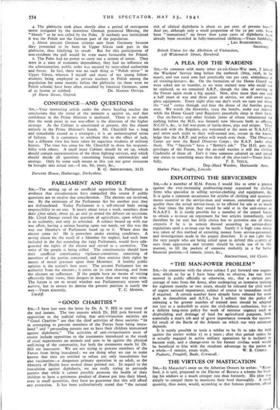A PLEA FOR THE WARDENS
SIR,—In common with many other ex-1st-Great-War men, I joined the Wardens' Service long before the outbreak (May, 1938, to be exact), and our rural area had practically too per cent, attendance at all training-lectures, &c. On the formation of the Home Guard We were asked not to transfer, as we were trained men who could not be replaced, so we remained A.R.P., though the idea of serving in the Forces again made a big appeal. Now, after more than one and a half years of war and three years of service, we still await com- plete equipment. Every night after our day's work we turn out when the " red " comes through and hear the drone of the hostiles going over. We watch the fireworks, trace the bombs, make our reports while the Home Guard (and Regulars) peacefully sleep in their beds.
Our ex-Servic, . and other friends (most of whom volunteered for nothing before the H.G. was formed) now blossom forth as officers, N.C.O.'s, &c., in full war-paint of battle-dress, pips and stripes. They hob-nob with the Regulars, are welcomed at the mess or and retire each night to their well-earned rest, secure in the know- ledge that the A.R.P. and police will watch over them. The Observer Corps are now the Royal Observer Corps ; the R.A.F. looks after them. The " Specials " have a "Bobby's job." The H.G. gets the privileges of the Forces, but the air-raid warden is still the civilian Cinderella of them all. Isn't it 'time someone adopted us and raised our status to something more than that of the also-ran?—Yours faith- Dep.-Head Warden, Horncastle Area. Market Place, Wragby, Lincoln.






























 Previous page
Previous page